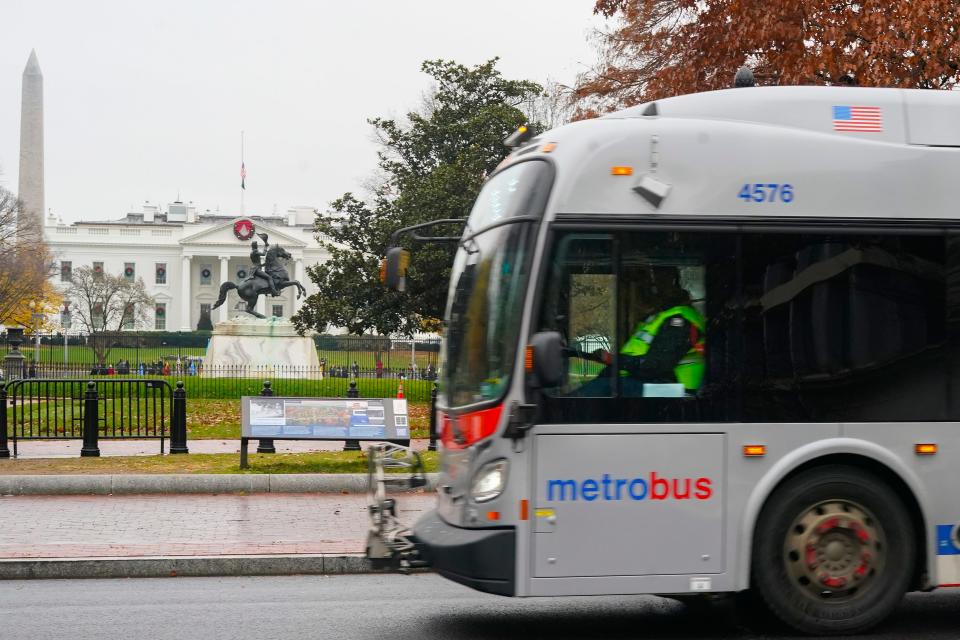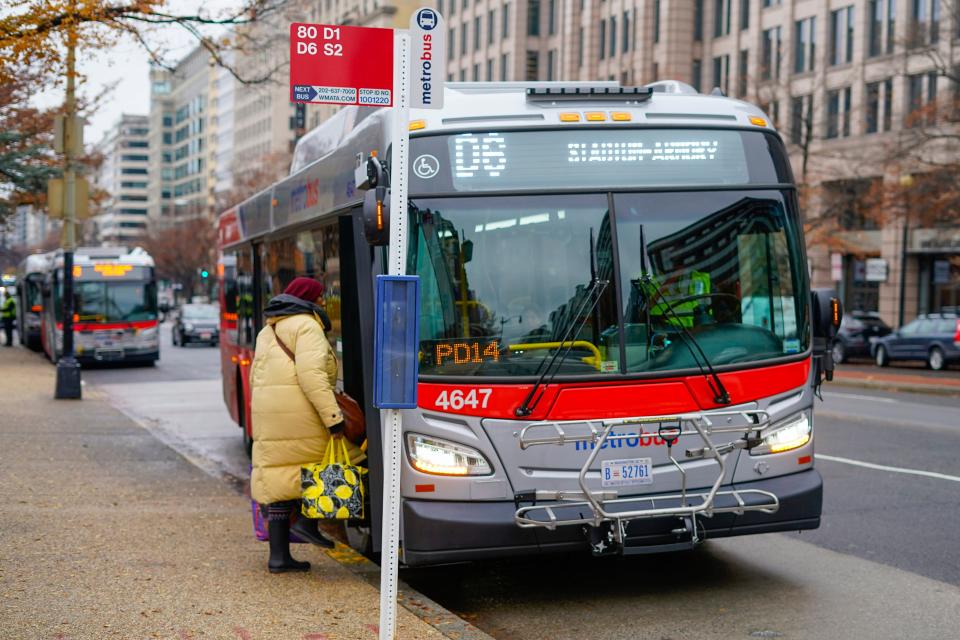For people in DC, the wheels on the bus will soon go 'round and round' for free
The nation's capital has become the largest U.S. city to announce plans for permanent free bus service along all routes, citing a desire to increase ridership.
The $2 bus fare will be waived starting July 1, 2023, after the D.C. Council's unanimous vote is finalized later this month.
The announcement comes after Kansas City, Missouri, launched its permanent ZeroFare program in March 2020 and Albuquerque, New Mexico, began a yearlong pilot in January, which has been extended through summer 2023.
Boston and Denver also have had short test runs of free public transit in 2022.
In Washington, there were about 180,000 bus rides a month this year through October, according to data from the transit authority. Pre-pandemic, the number was about 410,000 a month.
There's evidence waived fees bolstered ridership in Kansas City, a stated goal when the program was announced in late 2019. The system's ridership "decreased less" after COVID-19 hit compared to similar transit systems and recovered more quickly in 2020, according to an analysis from the the Mid-America Regional Council.
SUBWAY DEATH: Man dragged to death by NYC subway train after getting caught in doors, police say

What cities have free public transit?
Worcester, Massachusetts, and Alexandria, Virginia, (a D.C. suburb) also top the list of cities that have waived bus fees.
Worcester went fare-free in March 2020 and has extended the program through June 2023, according to its regional transit authority. Alexandria began its fare-free program in 2021.
In Olympia, Washington, bus fare is free as part of a multiyear pilot, which could go through the end of 2027, according to the transit system.
In late November, Connecticut began statewide free bus service, which is scheduled through March 31, 2023.
Los Angeles instituted free bus rides in 2020 but recently resumed charging riders. LA Metro has recently been testing a fare-capping plan under which transit riders pay for trips until they hit a fixed dollar amount and then ride free.
Across the country, a handful of smaller cities, ski communities and college towns also have free bus service available to any rider.
Other major U.S. cities have a more limited form of free public transportation, sometimes referred to as circulators or shuttles, in designated downtown areas. Miami and Tacoma, Washington, have free light rail service in parts of their downtowns.

How could riders benefit?
D.C. council member Charles Allen, who first proposed the measure in 2019, described free bus fares as a “win-win-win” for the District because they will help the transit system recover and offer affordable, green-friendly travel while boosting economic activity downtown.
Kansas City's transit agency anticipates a decrease in delays because riders can enter and exit buses without stopping to pay, according to the agency's website.
Proponents say riders with the lowest incomes stand to benefit because they're more likely to spend a greater share of their income on transportation, according to the Department of Transportation. In 2021, the poorest 20% of households spent 26.9% of their after-tax income on transportation, the department found.
In D.C., a majority of residents who take the bus have household incomes below $50,000, according to the council's budget analysis.
Are there downsides to zero fees?
Opponents of fare-free bus plans cite the high cost to taxpayers and concerns about safety issues due to increased ridership.
Pointing to increased security problems, city council members in Albuquerque, New Mexico, recently proposed fares be brought back. They plan to replace the current zero-fare system with free bus passes people can get after filling out an application.
In Kansas City, the transit system added security staff in response to "potential public concern" that increased ridership may cause safety issues, the transit agency says on its website. But the agency also noted that prior to the fare-free program, 90% of incidents involving bus drivers were a result of disputes over the $1.50 fare cost.
D.C. Mayor Muriel Bowser has raised questions about the $42 million annual cost over the long term.
“District residents and taxpayers will have to pay for this program,” she wrote in a letter to council members. “Our neighbors, Virginia and Maryland, should absorb some of these costs as their residents will benefit from this program as well.”
Contributing: The Associated Press
This article originally appeared on USA TODAY: Metrobus in Washington, D.C. to join cities with free bus service

